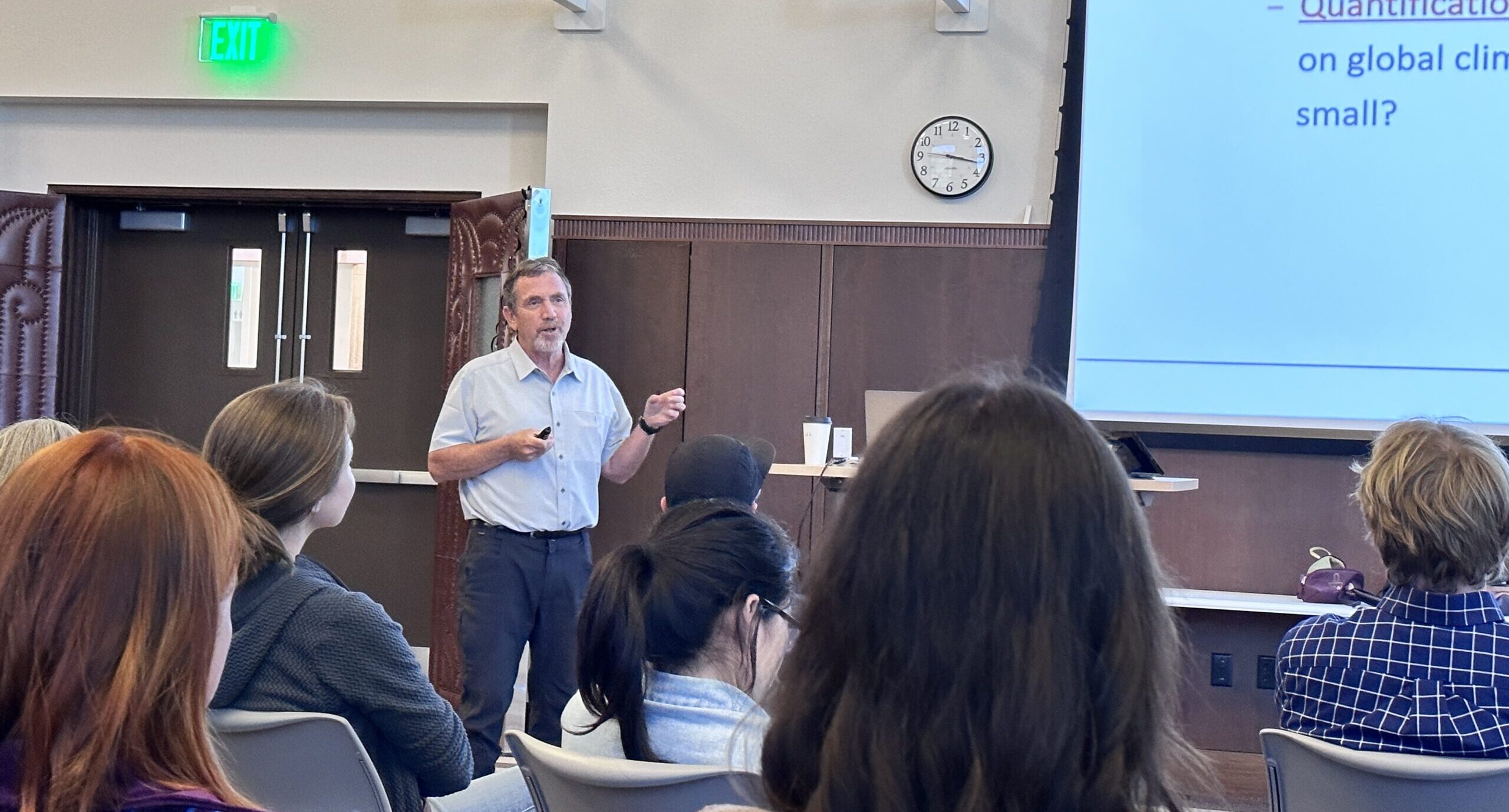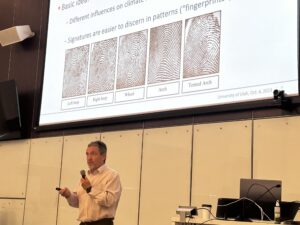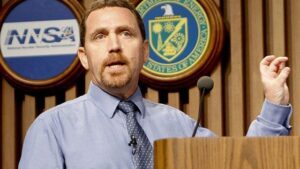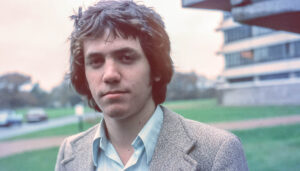
Ben Santer is a Fowler Distinguished Scholar in Residence at Woods Hole Oceanographic Institution and a Visiting Researcher at UCLA’s Joint Institute for Regional Earth System Science & Engineering. We at the Wilkes Center have been fortunate to have him working here at the University of Utah these past few weeks where he has given a number of talks about his research and work as the Wilkes Center Visiting Chair. You can find recordings of his talks and his presentation slides on our website, https://wilkescenter.utah.edu/speaker-series/ben-santer
Ben Santer was a key contributor to the historic 1995 conclusion of the Intergovernmental Panel on Climate Change that first declared “the balance of evidence suggests a discernible human influence on global climate”. Santer was a lead author of a key chapter of that report – chapter 8 – which Santer spoke about recently in a talk given at the University of Utah. Santer has done a lot of groundbreaking work to identify human fingerprints in atmospheric temperature and water vapor, ocean heat content, sea surface temperature in hurricane formation regions, and many other climate variables. In this episode, Santer shares four lessons he has learned in the course of his career as a climate scientist.
Listen to the interview
Transcript
Ross Chambless 1:47
So, there were specifically four lessons that you identified in your public talk last week. And I’ll just to kind of summarize what those four were. You said that one is defend scientific understanding. The other is never engage in science by eminence of position, don’t just preach to the choir, and declare your values. And I guess I just wanted to sort of unpack each of those, starting with the first one, and kind of just get a sense of how you came about that how that lesson unfolded for you. So, maybe could we start with the first one then, defend scientific understanding?
Defend Scientific Understanding

Ben Santer 2:34
Sure. What do I mean by that? Well, you mentioned the IPCC report and the infamous 12-word conclusion. Quote, “The balance of evidence suggests a discernible human influence on global climate.” So, that was finalized in November of 1995. And a lot of powerful individuals and companies and even countries didn’t like that finding. It was really the first time that the international scientific community spoke with one voice and said we can formally identify a human caused global warming signal. So some of these very powerful interests felt threatened by that finding. It might mean changes in the way they do business. It might mean that they would have to leave fossil fuels in the ground. And that finding the process by which it had been reached came under concerted attack after publication of the 1995 report in early 1996.
Some of the chief critics were in the Global Climate Coalition, a consortium of energy interests. They argued that the report had been politically tampered with, that there was, quote, “scientific cleansing,” unquote, so that all sense of uncertainty had been purged from Chapter Eight of this 1995 IPCC report. They argued that all of the findings in Chapter Eight were solely based on two of my own scientific papers, not on research of the entire community. And all of these claims were incorrect. But it took maybe one and a half years to defend that scientific understanding and the process by which it had been reached and set the record straight. That was very uncomfortable for me.
I had not really entered the public arena before, but I had a responsibility. I was the convening lead author of Chapter Eight, and I had to explain in plain English what we did, what we learned, and the process by which we had reached that discernible human influence finding.
Twenty-eight years later, I’m still defending scientific understanding. There are still powerful individuals, politicians running for the presidency of the United States, for example, who argue incorrectly, that there is no discernible human influence on climate and that indeed climate science is a hoax. A conspiracy. In my opinion, if you are a climate science scientist, it’s critically important to push back against that kind of willful ignorance and to explain to people that humans are no longer innocent bystanders in the climate system. Through burning fossil fuels we’re actively changing the climate and to explain how we know that where’s the beef? Where’s the scientific understanding? How have we reached this point in human history when we know that our actions are changing concentrations of heat trapping greenhouse gases in the atmosphere?
So that was one of the most profound lessons learned from my IPCC experiences in 1995 and subsequently that if you’re a climate scientist, you don’t have the luxury of remaining silent. You really have to explain in the public arena why what you do matters.
Ross Chambless 6:51
Well, yeah. Thank you. That’s really an important lesson. And thank you for sharing the context through which you received that or understood that lesson. Another lesson that you mentioned was never engage in science by eminence of position. So, what does that mean exactly?
Never Engage in Science by Eminence of Position

Ben Santer 7:17
Well, I spent 30 years at Lawrence Livermore National Lab doing climate change detection and attribution, using pattern recognition methods to try and disentangle human and natural effects on climate. And as I mentioned in response to the first lesson learned, that work was often attacked. It was criticized. Now, one response to that kind of criticism would have been to say, Trust me, I’m a bigwig scientist at a national lab.
I’m not going to respond to your criticism because I’m someone important and I’ve published a lot of papers. That’s what I mean by the second lesson. Don’t engage by, in science, by eminence of position. Don’t say I have these credentials; therefore, you should trust me. And I’m not going to address your criticism. No, the best response to informed scientific criticism is to do the research required to address the criticism. And I’m proud of the fact that during those 30 years at Livermore and now I’ve tried to do that, I’ve always tried to respond to justifiable scientific criticism by doing the research required to see whether the criticism had merit or not. And I’ll give you a couple of examples of that.
So, one example relates to the so-called “Data or Dogma?”, hearing that Senator Ted Cruz convened in the U.S. Senate in December 2015. And during that hearing, Senator Cruz argued that global warming had stopped in 1998. 1998 was a year when the planet experienced a very large El Nino event. On average, El Ninos warm the surface and the lower atmosphere. And Senator Cruz was arguing that if one started once analysis period in 1998 at this big seasonal and natural warming event associated with this El Nino and march forward in time, 18 years, there was no significant warming over that 18-year period. This is what he asserted in this Senate hearing.
Now, this was cherry picking. The satellite record actually starts in 1979, not in 1998. And Senator Cruz’s claim got a huge amount of attention. He repeated the claim not only in the Senate hearing, but also on Late night with Seth Meyers. And our group was asked at Livermore to comment on this claim. Was it justifiable or not?
So, one response would have been to say Senator Cruz is not qualified. And we are we are bigwig scientists at a national lab. Don’t believe his claim. But to me, the second lesson said that the more effective response was to actually address Senator Cruz’s claim. With all of the satellite temperature data in the world. Was he right?
Now, that required rolling up your sleeves and doing a substantial amount of analysis, and we did that. We decided that the most effective way of addressing Senator Cruz’s claim, particularly given that it had received such extraordinary public attention, was by looking not only at the period that Senator Cruz had focused on 1998 through to the time of his hearing in 2015. But to look at all possible 18-year periods in the longer 40-year satellite record. And there’s no particular diagnostic value in looking at an 18-year period. You could look at 19-year periods and 20-year periods and the entire 40 year satellite record. And that’s what we did.
And we showed in a paper published in the Journal of Climate in 2017 that Senator Cruz was wrong. Even if you cherry-picked because of the background global scale warming trend in the troposphere. Cherry-picking didn’t work and even over that selected period, there was significant global warming in the satellite estimates of temperature change in the lower atmosphere. So that’s what I mean. I’m not just dismissing his criticism out of hand as uninformed, but actually showing why he was wrong was powerful.
Ross Chambless 12:55
I think that’s a very valuable lesson to take away sort of no matter what your field, one’s field is or scientific focus, if questions arise, warranted or not, and don’t just assume that everyone’s going to take you seriously because you are a scientist or working in the ivory tower or wherever. So, I think that’s really valuable. And I guess you also had to kind of go out and perhaps put yourself in an uncomfortable situation. I mean, I think sometimes going out to challenge people who make assertions that are false while necessary, can also be challenging, can be difficult and perhaps be uncomfortable. And I guess that connects with one of the other lessons learned was don’t just preach to the choir. So, what did you mean by that?
Don’t Just Preach to the Choir

Ben Santer 14:12
You’re right. So, the second and third lessons are connected. The second lesson being never engage in science by imminence position. Trust me, I’m a big-league scientist at the national lab. And the third lesson being don’t just preach to the choir. Don’t just speak to your peers. Sometimes you have to get out of your comfort zone. And in the case I described addressing Senator Cruz’s claim that global warming had stopped in 1998 and that there had been no significant warming since then. I had to get out of my comfort zone big time. So, the publication of our paper in Journal of Climate rebutting Senator Cruz’s claim led to an opportunity to appear on Late Night with Seth Meyers, the very program where Senator Cruz had earlier made this claim on a late night talk show in front of an audience, potentially of millions of people, that there had been no significant warming since 1998.
And that was way, way, way out of my comfort zone, going on a late night talk show. But it was also an extraordinary opportunity to reach a different audience, not to just speak to my peers, but to speak to folks who had never engaged with satellite temperature data or never thought about why scientists have concluded that humans are affecting global climate. It was seven and a half minutes of sheer terror on Late Night with Seth Meyers, but also seven and a half minutes to get stuff off my chest, to say things that were important to say, to point out that Senator Cruz was demonstrably wrong. This wasn’t just my opinion, but a group of scientists had addressed his claim and showed that he was wrong.
I’ve also had opportunities to speak in front of Congress again outside of my comfort zone, to speak to highly conservative organizations that are skeptical about me and everything that I do. But to give them pause for thought. For example, at Bohemian Grove in the redwoods of Northern California, where each year folks from all over the world gather together for a few weeks. And these are referred to by the locals as the “masters of the universe.” So, think the Koch brothers, or very important people from politics or from industry. And I had 45 minutes of their time to talk to them about climate fingerprinting, about how we as scientists disentangle human and natural effects on climate. It was it was difficult to do that, but yet it was also an extraordinary opportunity to speak to people who could make a difference in the world, who could decide, gee, maybe I should endorse the precautionary principle here. If I really care about the well-being of my kids and grandkids, maybe I should think more seriously about what climate change might mean for them. And that’s the kind of thing I mean, by the third lesson. There are opportunities when you speak to novel audiences, you get them to listen. You try and find points of contact not only in the scientific arena, which gets to the fourth lesson.
Ross Chambless 18:35
Right. I feel like what you’re describing also, it kind of highlights the importance of communicating climate science in ways that are effective and, and so, yeah, I think that does lead to your fourth lesson learned which was declare your values. So how did you come about learning that lesson?
Declare Your Values
 Ben Santer 19:07
Ben Santer 19:07
As I mentioned in the third lesson, don’t just speak to your peers. It’s powerful to have the opportunity to address audiences who don’t necessarily care all that much about the science you’re going to talk to them about. They don’t care all that much about the details of climate fingerprinting and pattern recognition methods and satellite temperature data. But they might care about other things. They might care about changes in snowpack and what that means for their ability to continue ice climbing or skiing. They might care about changes in coral reefs and how warming of the oceans might affect the viability of coral reefs in the future. Because it affects their ability to go to the Great Barrier Reef and see cool stuff. It might resonate with them because they care about hunting or they care about fishing, or they care about something. Some area in which they personally have witnessed changes in climate and the impact of changes in climate on something they care about bird migration, or agriculture, and the timing of lake freeze, the timing of lake thaw, what that means for ice fishing.
There are there are opportunities to engage with people if you talk not just about science, but you declare your values. You tell them that this is important to me as a human being, not just as a climate scientist. And that’s what I try and do at the end of every lecture.
So, truth in advertising. I’m a climber. I’ve been climbing for over 50 years since I was 18. And in the course of climbing, I’ve had the extraordinary opportunity to visit beautiful, fragile, high alpine environments around the world. The Alps, the Himalayas, the North Cascades, the Rockies, and most recently, the Juneau icefield in Alaska. And over one human lifetime, over those 50 years, I’ve witnessed profound changes in glaciers around the world. The glacier that I stood on as a kid with my dad in Austria in 1966 is almost gone now.

So, I show pictures at the end of my presentations of these changes that I’ve witnessed. I show audiences pictures I’ve taken, and I declare my values that these places have meaning for me, that in my opinion, we are diminished as human beings if this stuff disappears on our watch. What do we lose if a glacier is gone? And it won’t come back for many, many tens of thousands of years. What do we lose if we lose tropical rainforests on our watch and we lose coral reefs, and we lose many other things that are or important to our essential humanity? So that’s what I mean by the “declare your values” lesson.
The stuff that I do isn’t just about climate science. It’s also about the kind of world in which we want to live. And we all get some say in terms of figuring out what kind of world we want to live in, not just our political masters. But each of us has the right to vote and the right to determine who elects us, who represents us, and what, you know, what issues they consider important and unimportant. So, I guess that’s the message of declare your values, that all of us have to not be silent, but figure out what kind of world we want to live in. And does that world have an intact climate system or not?
Ross Chambless 23:37
Right. And I think that in declaring your values, I think that’s an important strategy to finding commonality with others who may not necessarily have the same background as you. But at the end of the day, if you can show this is why this is important to you as a human being, as human beings, we often do have very similar values when it comes right down to it, whether it’s having a stable future for our children or other things.
Well, I just wanted to say, yeah, thank you so much for kind of taking the time to elaborate on those lessons learned from your work. You spent a few weeks here in Utah, and I think it’s been hopefully a really nice time to be here seasonally with the fall colors. But hopefully you’ve had a good experience. I don’t know what have been your impressions of our state?
Ben Santer 25:13
It’s not just been a good experience. It’s been a terrific experience. As you mentioned, Ross, I’ve been lucky enough to be here at peak fall color and getting out into the beautiful mountains that you were fortunate enough to be so close to at this time of year has been magical. That’s the word that comes to mind being out there in these Aspen forests when the wind kicks up and it rains, gold and little kids are holding out their hands in order to catch the golden leaves that are falling from the sky. Magical to look from one side of a mountain across the valley to another mountain and see this palette of gold from the aspens and the red and orange of the maples and green from and bluish green from blue spruces. Magical.
But it hasn’t only been magical in terms of my experience of the physical landscape around Salt Lake City. It’s also been magical being here at the Wilkes Center. For 30 years during my time at Lawrence Livermore National Lab I was behind a security fence that meant that it was difficult for me to interact with students to find out what they care about, what they’re doing, what they’re passionate about. And here at the Wilkes Center, I’ve had the opportunity to do that, to interact and meet with bright, highly motivated young women and men who want to change the world and will. And to hear their eloquent descriptions of what they do, what they’re working on, what a privilege to interact with you and many other faculty here at the Wilkes Center and in the Atmospheric Sciences Department to try and see points of intersection. So, how the work that you do interacts with my expertise and the kind of issues that I care about wildfires and the impact of human caused warming on the seasonal cycle and how, for example, the seasonal cycle of wildfire weather might be changing.
All of this is really stimulating. And I hope this is the beginning of a discussion involving me and folks at the Wilkes Center and that it won’t be another ten years until I return to Utah. I was here ten years ago to give a lecture at the Scientific Computing Institute, and it won’t be ten years till I come back again.
Ross Chambless 28:19
Great. Well, thank you so much. We’ve loved having you here, and you’re certainly welcome to spend time with us as much time as you’d like and going forward. Dr. Ben Santer, thank you so much.
Ben Santer 28:32
Thank you, Ross, for giving me this opportunity.
Relevant Research and Articles:
https://wilkescenter.utah.edu/speaker-series/ben-santer/